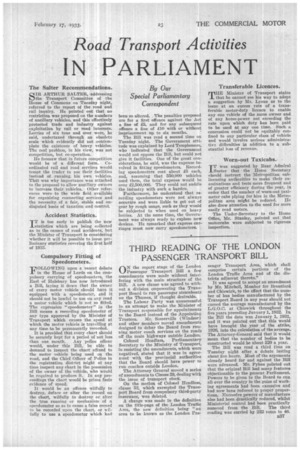THIRD READING OF THE LONDON PASSENGER TRANSPORT BILL
Page 51

If you've noticed an error in this article please click here to report it so we can fix it.
ON the report stage of the London Passenger Transport Bill a few amendments were made without inter
fering with the main structure of the Bill. A new clause was agreed to with out a division empowering the Transport Board to run passenger steamboats on the Thames, if thought desirable. The Labour Party was unsuccessful in an attempt to make the Minister of Transport responsible for appointments to the Board instead of the Appointing Trustees. Mr. Somerville (Windsor) and other members moved amendments designed to debar the Board from running motor coach services on the roads off the main highways outside London.
Colonel Headlani, Parliamentary Secretary to the Ministry of Transport, in resisting the amendments, which were negatived, stated that it was in agreement with the provincial authorities that the Board should have power to run coaches outside London.
The Attorney General moved a series of amendments to Clause 39, dealing with the issue of transport stock.
On the motion of Colonel Headlam, clause 53, which exempted the Transport Board from compulsory third-party insurance, was deleted.
A change was made in the definition on the title-page of the London Traffic Area, the new definition being "an area to be known as the London Pas senger Transport Area, which shall comprise certain. portions of the London Traffic Area and of the districts adjacent thereto."
It was agreed to accept an amendment by Mr. Mitchell, Member for Brentferd and Chiswick, to the effect that the number of bus bodies manufactured by the Transport Board in any year should not exceed the average manufactured by the L.G.O.C. at Chiswick throughout the five years preceding January 1, 1932. In the Bill the date was January 1, 1931, and it was pointed out that this would have brought the year of the strike, 1926, into the calculation of the average. The Attorney-General said that it would mean that the number of bodies to be constructed would be about 520 a year.
The Bill was read a third time on. Tuesday night after a debate lasting about five hours. Most of the arguments already heard for and against the Bill were advanced. Mr. Pybus pointed out that the original Bill had many features objectionable to the present Parliament. Powers to be given to the Board to run all over the country in the guise of working agreements had been excessive and had now been reduced to proper proportions. Excessive powers of manufacture also had been drastically reduced, whilst Ministerial control had been practically removed from the Bill. The third reading was carried by 232 votes to 46.




























































































